八年级英语下册《Unit 5 International charities Integrated skills》教学设计 牛津版
牛津译林版英语八下《Unit 5 International Charities》(main tas

he won an important gold medal for our
country at the TurinWinter Olympic
Games.
7. I _a_m__g_r_a_t_ef_u_l_t_o_ you for helping me
get out of the trouble.
2. Though they were very tired, they still _c_a_r_ri_e_d__o_n_w__it_h_ their work.
12
3. We should _k__ee_p__h_e_a_lt_h_y_ by eating well and exercising regularly.
3. How long will it take us _t_o_g_e_t___ ( get ) to the factory?
h
15
4. I’m going to study hard and improve m__y_s_e_lf_ ( I ) this term.
5. The pupils spent long hours _g_et_t_in_g_ ( get ) ready for the party.
h
19
4. Good news always
me happy.
A. makes; feel
B. make; feel
C. will make; to feel D. makes; to feel
5. Can you hear Jim
a Chinese song?
A. singing B. to sing
h
6
I think Mary really cares about other people and wants to help them. She does an important job and many people are grateful to her. I hope to have a job like Mary’s when I finish school.
八年级英语下册 Unit5 International charities Vocabulary课件
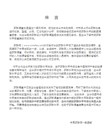
The doctor will operate on the patient.He will perform an operation.
move
ill
treat
careful
+ ment
+ ness
prevent
examine
+ ion
movement treatment illness carefulness prevention examination
ORBIS doctors treat many patients.The patients do not have to pay foHale Waihona Puke the treatment.
Many people are blind.Most cases of blindless can be cured or prevented.
5 The poor patient should _____(help). 6 Tom hopes that more people can send _____(donate) to ORBIS to support their work. 7 People must be _____(real) _____(grate) to you. 8 We are the _____(luck) ones.
Dear Amy I heard an _______ for UNICEF on the radio. UNICEF is an ______ that works to ______the lives of children. UNICEF wants to make the world a better place for children. It believes that all children should be able to get ____ .They should be helped when they are_____.They should also be treated with ______. Daniel
八年级英语下册 Unit 5 International charities 教案
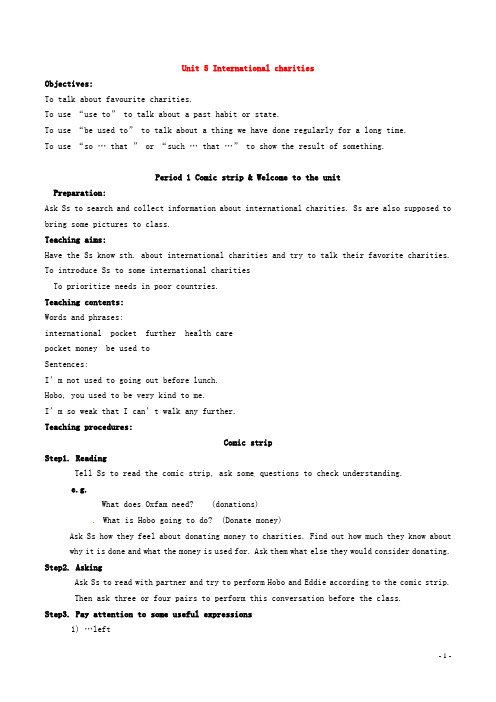
Unit 5 International charitiesObjectives:To talk about favourite charities.To use “use to” to talk about a past habit or state.To use “be used to” to talk about a thing we have done regularly for a long time.To use “so … that ” or “such … that …” to show the result of something.Period 1Comic strip & Welcome to the unitPreparation:Ask Ss to search and collect information about international charities. Ss are also supposed to bring some pictures to class.Teaching aims:Have the Ss know sth. about international charities and try to talk their favorite charities. To introduce Ss to some international charitiesTo prioritize needs in poor countries.Teaching contents:Words and phrases:international pocket further health carepocket money be used toSentences:I’m not used to going out before lunch.Hobo, you used to be very kind to me.I’m so weak that I can’t walk any further.Teaching procedures:Comic stripStep1. ReadingTell Ss to read the comic strip, ask some questions to check understanding.e.g.What does Oxfam need? (donations)What is Hobo going to do? (Donate money)Ask Ss how they feel about donating money to charities. Find out how much they know about why it is done and what the money is used for. Ask them what else they would consider donating. Step2. AskingAsk Ss to read with partner and try to perform Hobo and Eddie according to the comic strip.Then ask three or four pairs to perform this conversation before the class.Step3. Pay attention to some useful expressions1) …leftT: What does “left” mean here?e.g. There are only three students left.2) be used to doinge.g. He is used to getting up before 6:30 every morning.3) too…to…e.g. He is too weak to walk any further.Step4. How charities help peopleT asks Ss to present their information and pictures of international charities and say sth. about their charities. Ss exchange their ideas.Assignment: Make a dialogue according to the comic strip. Ss should replace Oxform and use other words.Welcome to the unitStep5. T introduces background informationThere are many international charities helping needy people and worthy causes all over the world. Look at some symbols in Part A. T uses these symbols to present the following charities. T puts the pictures with these symbols on the blackboard.Step6. TalkingTalk about international charities and the work they do. Ask Ss Which international charities they know and write a list on the board.Step7. Tell Ss To look at the symbols in Part A and the names of the charities in the box. Ask them to write the names of the charities under the pictures. Tell them to try to do the task on their own first, then compare answers with a partner.Step8. Check answers as a class. Then Ss How much they know about what the charities in Part A do and how they help people.Step9. Talk about what l ife is like for people who are very poor. Ask Ss to think about how their lives might be different if they had almost no money.Step10. Divide the class into pairs. Ask Ss to look at the list of items in Part B and decide which items are the most important and which items are the least important for people in poor countries.Assignment:Be able to know more international charities and try to remember their full names. Exercises:据句意、首字母和中文意思完成句子。
八年级英语下册《Unit 5 International charities suffixes》课件
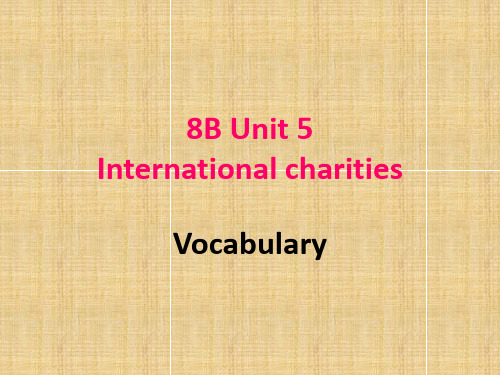
Sometimes, we need to change the ending of the verb/adjective before we add the suffix.
Keys to Part B
(1) advertisement (2) organization (3) improve (4) education (5) sick (6) kindness
treated with?
1)-er / -or 表示…人、…者
beginner receiver runner interviewer producer
editor visitor actor operator(操作员)
2) v. +ing
surfing camping cycling hiking skiing sightseeing birdwatching
8B Unit 5 International charities
Vocabulary
Fill in the blanks with the correct words.
• Many companies prefer to a_____ on TV. But I think there are too many a_____, I don’t like them.
2 collect
c_o_l_l_e_ct_i_o_n 8 improve impr_o_v__em__e_n_t
3 develop dev_e_lo_p__m_e_n_t 9 kind
_k_in__d_n_e_s_s
4 rich
_r_ic_h_n__e_ss_ 10 organize org_a_n__iz_a_t_i_on
Unit 5 International charities

Dr Ma is used to working on the ORBIS plane.
Dr Ma is used to his new job as an ORBIS doctor.
be used to+ doing “对...已感到习惯,或习惯于” to 是介 词,后需加名次活动名词。 Eg. She is used to taking a walk. 她现在习惯于散步。
such…that作“如此…以致”解,连接一 个表示结果的状语从句。与so…that 意思相 同,但用法不同。如:so…that这一结构中, so后边可加形容词或副词,而such后边要用 名词(这个名词前面可以带形容词,也可 以不带)。
Homework
Review what you have learnt today.
She is used to watching a basketball match during weekends.
She is used to having a walk every night.
B be used to
‘Be used to’ has a different meaning from ‘used to’. We often use ‘be used to’ to talk about something we have done regularly for a long time. We put it before a noun (phrase) or an ‘ing’ form a verb. For example:
Subject
‘be used to’
Noun (phrase)/ ‘ing’ form the hot weather. drinking coffee.
八年级英语下册:Unit 5 International charities语法解析(译林牛津版)
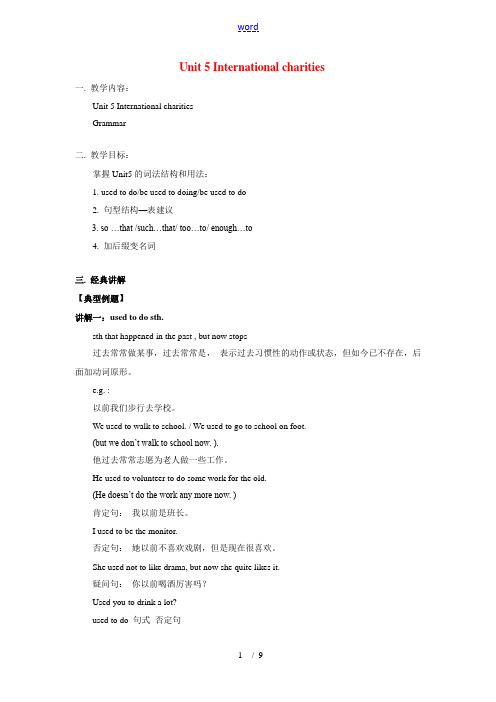
Unit 5 International charities一. 教学内容:Unit 5 International charitiesGrammar二. 教学目标:掌握Unit5的词法结构和用法:1. used to do/be used to doing/be used to do2. 句型结构—表建议3. so …that /such…that/ too…to/ enough…to4. 加后缀变名词三. 经典讲解【典型例题】讲解一:used to do sth.sth that happened in the past , but now stops过去常常做某事,过去常常是,表示过去习惯性的动作或状态,但如今已不存在,后面加动词原形。
e.g. :以前我们步行去学校。
We used to walk to school. / We used to go to school on foot.(but we don’t walk to school now. ).他过去常常志愿为老人做一些工作。
He used to volunteer to do some work for the old.(He doesn’t do the work any more now. )肯定句:我以前是班长。
I used to be the monitor.否定句:她以前不喜欢戏剧,但是现在很喜欢。
She used not to like drama, but now she quite likes it.疑问句:你以前喝酒厉害吗?Used you to drink a lot?used to do 句式否定句used not to dodidn’t use to do一般疑问句Used…to do …? Yes,…used. /No,…usedn’t.Did …use to do? Yes,…did. /No,…didn’t.他们以前不抽烟。
初中英语8B Unit5 International Charities课件
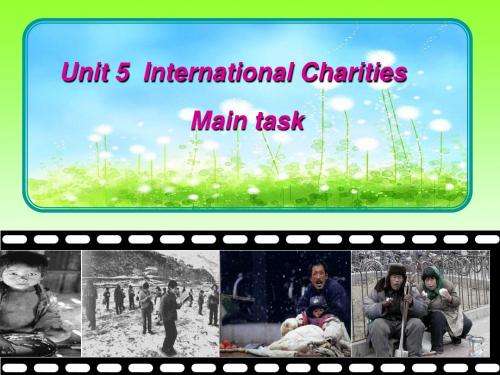
What charity can help them?
Mrs. Black has been blind since she was sixty years old. Now ten years past, she still can’t see anything because she is very poor and has no enough money to go to hospital.
5
I think Mary really cares about other people and wants to help them. She does an important job and many people are grateful to her. I hope to have a job like Mary’s when I finish school.
Red Cross
Different charities
What charity can help them?
Mr. Johnson is out of work now. The factory he has worked in for nearly twenty years bankrupted (破产)last month. He and his workmates have lost their jobs and they have less and less money to support their families.
One day, Mary saw a TV programme about ORBIS. She learned about the flying eye hospital. She wanted to help poor people too. She decided to go back to school and train as a nurse. Mary says that she loves helping people see again and teaching other nurses. She says she also enjoys visiting schools and telling students about her work. Mary used to work in the office of a big company. She used to travel by car because she was afraid of flying.
八年级英语下册 Unit 5 International charities 教案
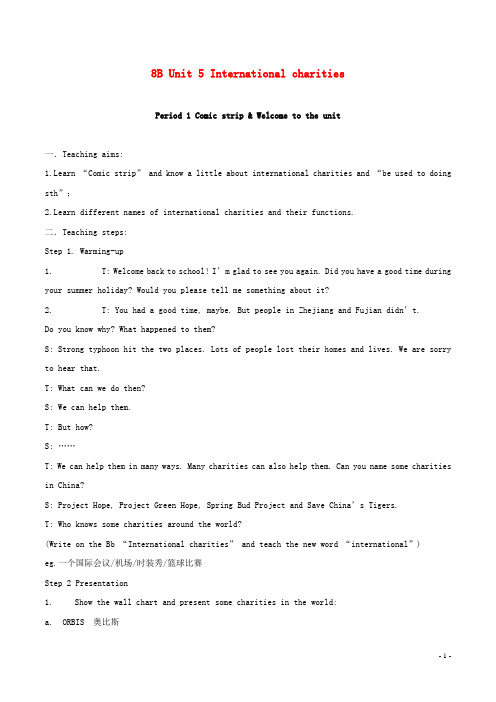
8B Unit 5 International charitiesPeriod 1 Comic strip & Welcome to the unit一.Teaching aims:1.Learn “Comic strip” and know a little about international charities and “be used to doing sth”;2.Learn different names of international charities and their functions.二.Teaching steps:Step 1. Warming-up1. T: Welcome back to school! I’m glad to see you again. Did you have a good time during your summer holiday? Would you please tell me something about it?2. T: You had a good time, maybe. But peopl e in Zhejiang and Fujian didn’t.Do you know why? What happened to them?S: Strong typhoon hit the two places. Lots of people lost their homes and lives. We are sorry to hear that.T: What can we do then?S: We can help them.T: But how?S: ……T: We can help them in many ways. Many charities can also help them. Can you name some charities in China?S: Project Hope, Project Green Hope, Spring Bud Project and Save China’s Tigers.T: Who knows some charities around the world?(Write on the Bb “International charities” and teach the new word “international”)eg.一个国际会议/机场/时装秀/篮球比赛Step 2 Presentation1.Show the wall chart and present some charities in the world:a. ORBIS 奥比斯Note: It’s a charity like a flying eye hospital. If people in poor countries have eye pro blems and they have no money to see the doctor, volunteer doctors will operate on them on a plane.b. Oxfam 乐施会Note: It’s a British charity that helps people in many ways.c. UNICEF 联合国儿童基金会Note: It’s a charity that helps children in need.d. World Vision 世界宣明会Note: It’s a Christian(基督教的) charity.e. WWF= World Wide Fund for Nature 世界自然基金会Note: It’s a charity that protects wildlife and nature.2.Practise reading them again and again.3.P 75 (Part A)Step 3 Discussion1.T: As we know, people in poor areas need a lot of things. What do they need?( Get the Ss to discuss)2.P75 Part B T: What do they need most/least?3.Get the Ss to make a report like this: I think they need…most/least.Step 4. Presentation1. Present some new vocabulary:a. pocket n. 口袋pocket money 零花钱T: I often give my son and daughter some pocket money. Who do you get pocket money from? How much pocket money do you get every week?b. used to do sth. 过去常常,以前常常T: I used to give my son only one yuan as his pocket money, but now I give him two yuan. Eg.过去常常帮助别人/过去曾当过主持人/过去曾住在农村/过去不喜欢音乐c. be used to doing sth.look forward to doing sth.T: I like walking. I’m used to walking after supper.Eddie likes eating meat. He is used to eating meat.My husband is very lazy. He is used to getting up late.eg.习惯于生活在城里/ 习惯于早起/习惯于讲英语/习惯于喝果汁d. health care 医疗T: I think people in poor areas have no money to see doctors. They need health care. Step 5 Comic strip1. Show the Ss the wall chartT: What do you think of Eddie and Hobo?(Get the Ss to speak freely.)2. T: I think Hobo is not only clever but also kind. He is going to do something kind. Listen to the conversation between Eddie and Hobo and find out:a. What is Hobo going to do?b. What time is it now?c. What does Eddie want to do first?d. Where will they go?3. Books open! Get the Ss to raise some difficulty.a. left 留下,剩下eg.我还剩下10元。
- 1、下载文档前请自行甄别文档内容的完整性,平台不提供额外的编辑、内容补充、找答案等附加服务。
- 2、"仅部分预览"的文档,不可在线预览部分如存在完整性等问题,可反馈申请退款(可完整预览的文档不适用该条件!)。
- 3、如文档侵犯您的权益,请联系客服反馈,我们会尽快为您处理(人工客服工作时间:9:00-18:30)。
《Unit 5 International charities Integrated skills》教学设计【教学目标】知识目标:1.掌握本课时的四会单词:war词组:make a donation do voluntary work instead of句型:UNICEF helps make the world a better place for children. UNICEF believes that all children should have clean waterand food so that they can be healthy.2.了解联合国儿童基金会的工作范畴及基本的背景知识。
能力目标:1. 能从听力材料中获取相关有用的信息。
2. 能用已掌握的信息使相关文章的意思表达完整。
3. 能谈论自己为慈善组织做贡献的想法。
情感目标:1. 通过小组合作学习,学生能感受合作的愉快,培养合作精神。
2. 联系实际生活,学生能意识到互相帮助的重要性,培养社会责任感,长大后能为慈善组织做贡献。
【教学重点、难点】1.从听力材料中获取相关有用的信息并了解联合国儿童基金会的工作范畴及基本的背景知识。
2. 谈论自己为慈善组织做贡献的想法。
【教学步骤】Step 1 RevisionShow students the logos of some internationl charities , have a competition to revise different charities around the world. (ORBIS, Oxfam, World Vision, World Wide Fund for Nature, UNICEF)Say to students: we’ve learned some internationl charities. First ,let’s have a competition, I’ll show you the logos of the charities one by one, If you can tell each of their names correctly, you will get one point for your group. If you can tell what each of them does, you can get two points for your group.Step 2 Presentition1.Show students some pictures of poor children around the world (some of them don’t have food or clean water, some of them are homeless because of the war, some ofthem have to go to work to support their families instead of going to school……) .Ask students : What problems do these children have ?Teach new words : war, instead of.2. Ask students to discuss in groups of four:Which charity can help these children?What do you know about UNICEF?Step 3 CompetitionRound 1: Read the information about UNICEF in PartA2 on Page86. Answer the questions :(1)When was UNICEF set up ?(2)What’s the aim of UNICEF?(3)Why was UNICEF set up?(4)How many countries and areas does UNICEF work in?Round 2: Read the information about UNICEF in PartA1 on Page86. 2. Judge the sentences and correct the mistakes.(1)UNICEF wants children to go to work.(2)UNICEF provides clean water, food and education for poor children inmany countries.(3)UNICEF raises money by selling books and organizing otherfund-raising activities..(4)You can help UNICEF only by doing some voluntary work.Round 3: Listen and finish PartA1 on Page 86: Help Daniel put the sentences into the correct order. Write the numbers 1-5 in the boxes.Step 4 Pair workHave an interview.Work in pairs: Suppose one of you is a reporter, and the other is a UNICEF worker. The reporter is interviewing the worker about the history of UNICEF and its main work. Ask several pairs to practise the dialogue out.Step5 Group workAsk students to work in groups of four : Complete the report in PartA4 on Page87. Then check the answers.Step6 ListeningListen to the conversation between Kitty and Daniel and answer the questions:1. What is Kitty’s favourite charity? Why?2.What is Daniel’s favourite charity? Why?Step7 Pair workAsk students to make up similar dialogues to talk about their favourite charities. Step8 DiscussionAsk students to discuss in groups of four: Would you like to do something for charities when you grow up? Which charity would you like to help most? Why? How would you like to support it? Before they discuss , tell them : each group should choose a reporter. Then ask several reporters to give a report.Step9 SummaryAsk students to conclude what we have learned this class.Tell students it’s important for us to help charities around the world . Choose the best group in this class.Step10 HomeworkSearch for more information about UNICEF on the Internet. Write a brief introduction about UNICEF.【设计理念】根据新课标,英语学习的过程应以学生“用英语做事”为主线,强调培养学生综合语言运用能力,在做事情的过程中发展语言能力、思维能力以及交流与合作的能力的理念而设计,借助于多媒体课件力求课堂教学最优化。
【设计思路】首先以竞赛的形式复习国际慈善机构和它们的目标,吸引学生注意力,激发学生学习兴趣,使学生在情绪饱满、热情高涨、积极主动的状态中去获取知识。
既复习了已学知识又为新课导入打下基础。
接着向学生展示世界各地贫困儿童的图片,在展示图片的过程中提问这些儿童面临着什么困难,这样既在真实的语境中教会了学生新词汇,同时又激起了学生的同情心和爱心。
在此基础上及时让学生讨论:哪个慈善机构能帮助这些孩子?因为有前面复习的基础,同学们自然而然地会想到UNICEF能帮助他们。
同时抛出问题:对UNICEF你们都了解些什么?学生们展开讨论。
在学生讨论的基础上告诉他们:Daniel访问了UNICEF网站,找到了一些信息,让学生读A2部分信息回答相关问题,接着让学生读A1部分信息做判断正误练习,让学生带着任务去阅读,培养阅读技巧。
然后让学生听完成A1部分排序的练习。
这三个练习都是让学生以竞赛的形式完成的,这样既调动了学生学习的积极性,又培养了学生的集体主义荣誉感。
我先让学生读,再让学生听主要是因为我们这些学生都是农村的孩子,英语基础不太好,而且原来对UNICEF也没多少了解,这样打乱顺序是为了降低学生听的难度,便于学生更好地理解听力内容。
通过此环节的设计,让学生体验、经历、提升掌握知识的能力。
同时也为下面自由对话扫清语言障碍。
在对UNICEF有了一定了解的基础上我设计了一个采访,以记者采访UNICEF工作人员的形式复习巩固有关UNICEF的基本知识。
接着我又让学生四人一组合作完成A4部分有关UNICEF 的报告。
这两个环节的设置培养了学生合作交流的能力。
对于Speak up我设计了一个听,回答相关问题和两人一组谈论自己最喜欢的慈善机构的环节。
这一部分再次培养了学生听和说的能力。
接着我设计了四人一组的讨论Would you like to do something for charities ? Which charity would you like to help most when you grow up? Why? How would you like to support it?讨论之前我明确了每个小组都必须选出一个同学做最后的报告。
